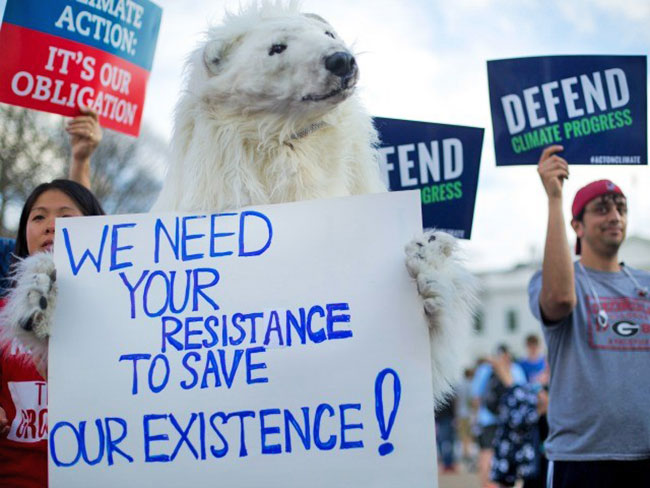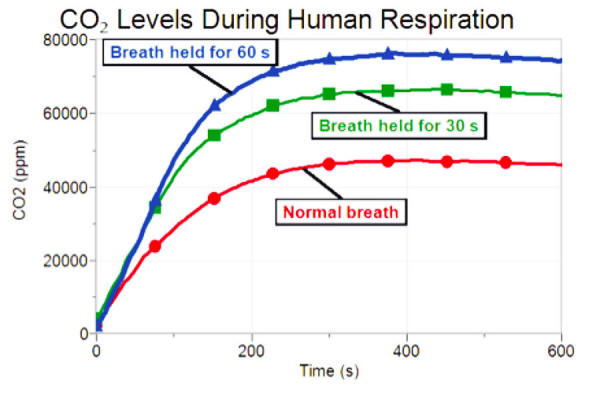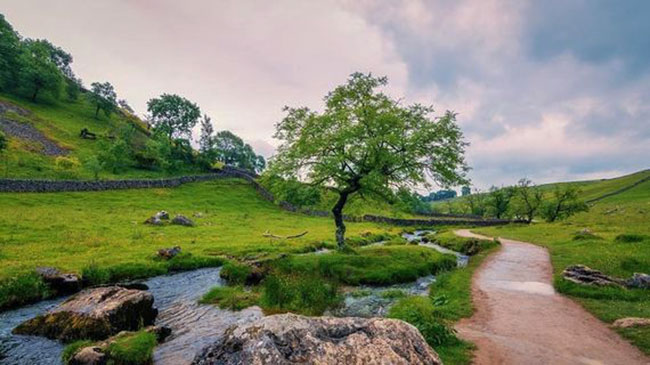|

by James Delingpole
October 2017
from
Breitbart Website

István E. Markó (1956
- 2017)
Those who were privileged to study with István Markó
celebrated his
pedagogic talent and his ability
to captivate and
enthrall the novice chemistry student.
Those who met him in
other contexts
would highlight his
legendary story-telling skills
and charismatic
eloquence.
On July 31, 2017,
István Markó
unexpectedly passed
away at the age of 61.
Part 1
The
Science
October 28, 2017

Maybe the biggest of all the lies put out by the global warming
scaremongers is that the science is on their side.
No it isn't. And
if you're in any doubt at all you should read this interview with
the brilliant scientist István Markó.
It tells you all you need to
know about the science of global warming.
Dr. Markó, who sadly died earlier this year aged only 61, was a
professor and researcher in organic chemistry at the Université
Catholique de Louvain, Belgium's largest French-speaking university.
More importantly for the purposes of this
interview, he was one of the world's most outspoken and
well-informed climate skeptics, who contributed to several
articles on the subject for Breitbart News.
Before he died, he gave an extensive interview to
the French journalist
Grégoire Canlorbe. Here are highlights of the English
translation.
As you'll see, he doesn't pull his punches...
CO2 is not - And has never
been a poison
Each of our exhalations, each of our breaths,
emits an astronomical quantity of CO2 proportionate
to that in the atmosphere (some >40,000 ppm); and it is very
clear that the air we expire does not kill anyone standing in
front of us.
What must be understood, besides, is that CO2
is the elementary food of plants.
Without CO2 there
would be no plants, and without plants there would be no oxygen
and therefore no humans.
Plants love CO2 - That's why
the planet is greening
Plants need CO2, water, and
daylight.
These are the mechanisms of photosynthesis, to
generate the sugars that will provide them with staple food and
building blocks.

That fundamental fact of botany is one of the
primary reasons why anyone who is sincerely committed to the
preservation of the "natural world" should abstain from
demonizing CO2.
Over the last 30 years, there has
been a gradual increase in the CO2 level.
But what is
also observed is that despite deforestation, the planet's
vegetation has grown by about 20 percent. This expansion of
vegetation on the planet, nature lovers largely owe it to the
increase in the concentration of CO2 in the
atmosphere.
There have been periods
where the CO2 concentration was many times higher than now. Life
thrived.
During the Jurassic, Triassic, and so on, the
CO2 level rose to values sometimes of the order of
7000, 8000, 9000 ppm, which considerably exceeds the paltry 400
ppm that we have today.
Not only did life exist in those far-off
times when CO2 was so present in large concentration
in the atmosphere, but plants such as ferns commonly attained
heights of 25 meters.
Reciprocally, far from benefiting the
current vegetation, the reduction of the presence of CO2
in the atmosphere would be likely to compromise the health, and
even the survival, of numerous plants.
To fall below the
threshold of 280 or 240 ppm would plainly lead to the extinction
of a large variety of our vegetal species.
Animals need CO2 too. And by
the way – forests are not the 'lungs of the earth'…
In addition, our relentless crusade to reduce
CO2 could be more harmful to nature as plants are not
the only organisms to base their nutrition on CO2.
Phytoplankton species also feed on CO2, using carbon
from CO2 as a building unit and releasing oxygen.
By
the way, it is worth remembering that ~70 percent of the oxygen
present today in the atmosphere comes from phytoplankton, not
trees.
Contrary to common belief, it is not the forests, but the
oceans, that constitute the "lungs" of the earth.
It is not true that CO2 has
a major greenhouse effect - Reports of its influence have been
exaggerated
It is worth remembering here too that CO2
is a minor gas.
Today it represents only 0.04 percent of the
composition of the air; and its greenhouse effect is attributed
the value of 1. The
major greenhouse gas in the atmosphere is water vapor which
is ten times more potent than CO2 in its greenhouse
effect.
Water vapor is present in a proportion of 2 percent in
the atmosphere.
Those facts are, in principle, taught at school
and at university, but one still manages to incriminate CO2
alongside this learning, in using a dirty trick that presents
the warming effect of CO2 as minor but exacerbated,
through feedback loops, by the other greenhouse effects.
Climate change is natural
Over the last 12,000 years, what we have
witnessed is an oscillation between warm and cold periods, thus
periods with rising and declining sea levels.
Incontestably, sea
and ocean levels have been on the rise since the end of the
Little Ice Age that took place approximately from the beginning
of the 14th century until the end of the 19th
century. At the end of that period, global temperatures started
to rise.
That being said, the recorded rise is 0.8 degrees
Celsius and is, therefore, nothing extraordinary. If the
temperature goes up, ocean water obviously dilates and some
glaciers recede.
This is something glaciers have always done,
and not a specificity of our time.
Don't worry about shrinking
glaciers. We've been here before…
In Ancient Roman times, glaciers were much
smaller than the ones we know nowadays.
I invite the reader to
look at the documents dating back to the days of
Hannibal, who managed to cross the Alps with his elephants
because he did not encounter ice on his way to Rome (except
during a snow storm just before arriving on the Italian plain).
Today, you could no longer make Hannibal's journey.
He proved to
be capable of such an exploit precisely because it was warmer in
Roman times.
Sea level rise is normal
Sea levels are currently on the rise; but
this is an overestimated phenomenon.
The recorded rise is 1.5
millimeters per year, namely 1.5 cm every ten years, and is,
therefore, not dramatic at all. Indeed, it does happen that
entire islands do get engulfed; but in 99 percent of the cases,
that is due to a classic erosion phenomenon [1]
and not to rising sea levels.
As far as the Italian city of
Venice is concerned, the fact it has been faced with water
challenges is not due to any rise of the lagoon level and is
just the manifestation of the sad reality that "the City of the
Doges" is sinking under its weight on the marshland.
Once again,
the global sea and ocean levels are rising; but the threat
effectively represented by that phenomenon is far from being
tangible. I note that the Tuvalu islands, whose engulfment was
previously announced as imminent, not only have not been
engulfed, but have seen their own land level rise with respect
to that of waters around them.
[1] The island shores are eroded by the persistent pounding
of the ocean waves. This is perceived as 'sinking' or as 'sea
level rise,' but the upward creep of the waters is due to island
soil being washed away.
The polar ice caps are fine
too
Still another phenomenon we tend to
exaggerate is the melting of the polar caps.
The quantity of ice
in the Arctic has not gone down for 10 years. One may well
witness, from one year to the other, ice level fluctuations,
but, on average, that level has remained constant.
Right after
the Little Ice Age, since the temperature went up, the Arctic
started to melt; but the ice level in the Arctic finally settled
down.
Besides, ice has been expanding in Antarctica over the
last 30 years and, similarly, we observe in Greenland that the
quantity of ice increased by 112 million cubic kilometers last
year.
On a global scale, glaciers account for peanuts, with most
of the ice being located in Antarctica and so on.
Extreme weather events are
actually decreasing
From storms to tornados, extreme events are
going down all around the world and, when they occur, their
level is much lower, too.
As explained by MIT physicist
Richard Lindzen, the reduction of the temperature
differential between the north hemisphere and the equatorial
part of our planet makes cyclonic energy much smaller:
the
importance and frequency of extreme events thus tend to
decrease.
Recent warming is modest - Much smaller than the alarmists' various computer models
predicted
If you look at satellite data and weather
balloon measurements, you then note that the temperature rise
around the world is relatively modest, that it is much lower
than the rise that is
predicted for us by authorities, and that these predictions
rely on calculations that are highly uncertain.
This is because
the simulation inputs cannot take into account past
temperatures, for which there is no precision data, [1]
except by subjectively adjusting x, y, z data that are not
always known.
The recent temperature spikes measured by
satellites and balloons are part of a classic natural phenomenon
which is called
El Nińo.
This short-term phenomenon consists of
a return of the very warm waters at the surface of the
equatorial Pacific Ocean.
The heat thus liberated in the
atmosphere pushes up the global temperature and CO2
plays no role in that process.
Claims by alarmist 'experts'
that 2016 was that 'hottest year ever' are pure balderdash
The World Meteorological Organization –
another emanation of the United Nations and which is also, like
the IPCC, an intergovernmental forum – declares 2016 the year
the warmest of history.
Knowing that 2016 is supposedly hotter
by 0.02°C than 2015 and that the margin of error on this value
is 0.1°C, we see the absurdity of this statement.
For those who
don't understand, this means that the variation in temperature
can be of +0.12°C (global warming) or -0.08°C (global cooling).
In short, we can't say anything and WMO has simply lost its
mind.
No, 'climate change' hasn't
led to an increase in tropical diseases
Climate-related diseases are relatively rare;
and even malaria does not directly depend on the climate, but
rather on the way we enable the parasite to reproduce and the
mosquito to flourish in the place where we are located.
If you
find yourself in a swampy area, the odds you will get malaria
are high; if you have drained the system and you no longer have
that wetland, the odds you will catch the disease are very low.
In the end, automatically blaming the resurgence of some disease
on climate change comes down to removing the personal
responsibility from the people involved:
such as denying that
their refusal of vaccinations, for instance, or their lack of
hygiene, may be part of the problem.
Again, CO2 is greening the
planet. And that's a good thing. So stop demonizing it!
Present deserts, far from expanding, are
receding; and they are receding due to the higher quantity of CO2
available in the air.
It turns out that greenhouse operators
voluntarily inject three times as much CO2 in the
commercial greenhouse as it is present in the atmosphere.

The
result we can observe is that plants grow faster and are bigger,
that they are more resistant to diseases and to destructive
insects, and that their photosynthesis is way more efficient and
that they, therefore, consume less water.
Similarly, the rise of
CO2 level in the atmosphere makes plants need less
water so they can afford to colonize arid regions.
Part 2
Politics, Economics, Arnie…
October 31, 2017

Dr Markó, who died earlier this year, was
professor and researcher in organic chemistry at the Université
Catholique de Louvain, Belgium's largest French-speaking university,
as well as a Breitbart contributor and a brilliant and outspoken
climate skeptic.
Part II deals with the 'politics' and 'economics' of global warming:
The 'science' on global
warming has been hijacked by left-wing politics
To begin, I believe in science: I mean that I believe in the
possibility of objectively knowing reality through science.
I believe that there are truth and falsehood,
that science allows us to distinguish between the two, and that
truth must be known; that scientific knowledge must be placed in
the hands of the population.
I also believe in freedom.
I believe that
every man is entitled to lead his life and to manage his goods
as he sees fit, that he is the only possessor of himself, and
that statist socio-economic control is as morally reprehensible
as it is harmful in its social, economic, and environmental
consequences.
The people are being taken for a ride
I note two things distressing me:
-
firstly, the population is
increasingly misinformed scientifically
-
secondly, the media and governments
take advantage of this to propagate a theory that is
doubtful, namely that of anthropogenic warming, and to
promote coercive measures on its behalf
Few people take the time to get vital
information about the actual CO2 footprint; and few people, more
generally, are still interested in science.
I deeply regret that our Western societies
have succeeded in cultivating such mistrust of science:
such a reluctance to have confidence in
its capacity to know the world objectively and to transform
it positively.
Anthropogenic Global Warming theory is not
real science
The theory of anthropogenic warming claims to be
scientific; but if people accept this theory, if they hold it to
be true, it is clearly not out of interest for science.
Such a fragile theory, in view of the CO2
facts I have presented to you above [see Pt I of the interview],
could never have been accepted by people who truly care about
science; and who possess a deep understanding in that field.
It's about religion and self-hatred
In my eyes, there are two main reasons - or if you prefer, two
main types of feelings - that make people let themselves be
seduced by the theory of anthropogenic warming so readily.
In the first place, the Catholic religion
is in decline in the Western world; and what I call
ecologism comes to replace it.
In the second place, Westerners have a pronounced taste for
self-flagellation; and the theory of anthropogenic warming
provides justification for that tendency, possibly anchored
in our Judeo-Christian heritage.
So, on the one hand, we have religious
feelings:
faith in a new system of thought, which is ecologism, the veneration of a new divinity, which
is benevolent and protective Nature.
On the other hand, we have a feeling of
guilt, expressed in our conviction that, if the climate warms
up, it is our fault; and that if we do not immediately limit our
CO2 emissions, we will have sullied and disfigured our planet.
The scarce resources/Limits to Growth myth
To begin, those who convey the idea that the finite character of
resources renders infinite growth impossible, leave out of
account the ability of the human being to innovate in our
technology, to enrich our knowledge of nature, and to enhance
our extraction strategies.
Let us take the case of this finite resource
that is petroleum:
-
one notices, firstly, that new
reserves are regularly discovered
-
secondly, that the depleted oil
reserves, (originally tapped by conventional drilling)
are exploited by more advanced methods which improve the
yield and recovery rate of remaining, formerly
unrecoverable oil
-
and thirdly, that the "peak oil,"
which Malthusians constantly say is about to be reached,
is constantly postponed.
On the other hand, humankind devises
recycling methods that let us glimpse the possibility, in a more
or less surrealist future, to build growth on perpetually and
integrally recycled resources.
Stop whining about 'mass consumption' and
'industrial progress' - They have made us wealthy, healthy and
free
To blame mass consumption and industrial progress as such leaves
me perplexed, were it only because it is waste, not consumption
itself, which is the real problem.
As much as the struggle against waste seems
to me to be well-founded and necessary, the struggle against the
"consumer society," which happened to inspire a certain
terrorism, seems to me irrelevant.
I recall that it is notably mass consumption
derived from the industrial exploitation of fossil resources
that have liberated Western society from poverty and from a
whole series of tasks that previously degraded him.
The victory of medicine, which is so often
praised, would never have been possible, without the chemistry
of fossil resources.
It is the chemical and industrial advances in
pesticides, insecticides, and fertilizers that have enabled us
to master our environment.
The Soviet dissident author Alexander
Solzhenitsyn railed against the way industry and mass
consumption have destroyed our spirituality and made us mad -
This is rubbish
Solzhenitsyn's criticism seems to avoid denying the economic and
sanitary benefits of "progress."
That is, it seems to focus on the
psychological consequences. But even from that point of view,
one easily exaggerates the deleterious effects associated with
scientific and technological development and the resulting
material comfort and mass consumption.
Pathological behaviors, such as addiction,
are the work of a minority of consumers: they are therefore
exceptional and accidental; and not a sort of congenital disease
of "consumer societies."
As to the idea that having a comfortable life would create in us
a moral desert, that it would make us greedy and heartless, this
notion does not stand up to scrutiny either.
It is enough to note to what extent people in
opulent societies give to charitable organizations of all kinds.
Ironically, Asian societies, which have
remained faithful to their spiritual traditions, today cultivate
a much greater respect for science and technology than that
which prevails in the secularized West.
It is therefore false to claim, as
Solzhenitsyn seems to do, that the spirituality of people
atrophies as their way of life is more centered on science and
technology.
The real problem with improved material
comfort is this - It has made people soft and forgetful of how
hard-won our achievements are
There are indeed psychological drawbacks that I think can be
legitimately attributed to material comfort.
Over generations it gradually disposes people
who take their comfort for granted, to lose sight of the
inhospitable and dangerous world in which they live.
Blinded by the ease of their standard of
living, and the facilities stemming from their scientific,
industrial, and technological advancement, Westerners have
finally forgotten a fundamental law: this world gives nothing
without effort.
Again, the reason we are able to inhabit this
planet in conditions that are so favorable to our health and to
our hygienic wellbeing, as well as to our economic and
demographic development, is that we have rendered our
environment hospitable.
We are far too sentimental about Nature -
Which is cruel and harsh
Gaia does not take us under her protection; nor is she that
delicate and innocent goddess, offended by blood and toil, raped
by factories, mines, and urban groups, which ecologists
celebrate.
I mentioned above the colonization of deserts
by plants thanks to the greater amount of CO2
available to them.
Colonization genuinely comes from Nature
itself, not the human being; it is not so much that humans
"invented" colonization, or industry, commerce, war, or even
infanticides; we only inherited those behaviors from Nature.
If the reader does not take me seriously on
infanticides, let him think of the polar bears that do not
hesitate to kill their own offspring and to take their heads
away for the evening meal.
Wind energy is an economic and environmental
disaster
The wind industry, over which ecologists swoon, produces highly
unpredictable output, depending on the intensity of the wind.
Even under good atmospheric conditions, wind
delivers too little electricity to be a profitable industry on
its own.
Warren Buffet, who owns one of the
largest wind farms in Iowa, said it without embarrassment:
"On wind power, we get a tax credit if we
build a lot of wind farms. This is the only reason to build
them. They do not make sense without the tax credit."
The ecological balance is just as bad:
onshore wind turbines kill hundreds of thousands, even millions
of birds and bats per year.
As for wind turbines at sea, they kill many
marine mammals, again in the utmost indifference of ecologists.
Nuclear, not renewables, is the answer
We are plagued, in Europe, by a morbid fear of nuclear power.
The Chinese, but also the Russians and the
Indians, know that this fear is irrational, and that renewables
that can only provide intermittent energy, are not a viable
alternative.
They are developing their nuclear industry at
a brisk pace and are already experimenting with the
next-generation, thorium-fueled nuclear reactor.
As for the Germans and the French, and soon
the Belgians, alas, they are regressing!
They are horrified by the
Fukushima accident, encouraged by silly elites, and so they
are destroying their wonderful energy/power generation
industrial parks, becoming the laughing stock of emerging
countries.
I recall that the earthquake and the tsunami
of 2011 certainly caused numerous victims, about 20,000 deaths.
But
no one has died because of the nuclear industrial accident as
such.
The West's green ideology
means we are being overtaken by the Russians, the Indians and
the Chinese
In the United States, there currently happens
to be an upsurge in funding for what one calls small modular
units.
But China assuredly possesses leadership in
the nuclear industry. They are in first place before the
Russians and the Indians.
The Chinese regularly build nuclear power
plants, having become masters in that field, they do so faster
and faster. They are, today, in the process of devising two
thorium-based nuclear pilots.
They know that its combustion results in
highly radioactive products, with long life spans; but they have
managed to solve that problem and find a way to obtain ultimate
products that are very weakly radioactive.
Besides this, the Chinese are on the way to
becoming leaders in the conquest of space.
They built their own platforms, which they
managed to send into space and they also have their own
launchers, which are extremely reliable, and which are much
cheaper, for example, than the Ariane launchers.
If the Chinese are such high performers and
so innovative, it is because, like the Indians and the Russians,
they have faith in science: they have faith in the ability of
science to embellish their future and to create a better world.
In Europe, there was a time when we, too, had
faith in science; and faith in an evolution of our societies
that would rest on science.
Today we have not only turned our backs on
science, we are choked and infantilized by bureaucrats who suck
the living forces of the old continent.
Ecologism is the communism
of the 21st century
Many persons, generally those coming from the
former Eastern Bloc, let themselves be seduced by the idea that
the resolution of our environmental problems would be that of
global governance. In many respects, ecologism is also the
communism of the 21st century.
In the same way as Islam, it occupies the
place left vacant by the decline of Marxism-Leninism.
I do not know if a convergence of struggles
between Islamists and ecologists will actually take shape;
however, I note that we already have the equivalent, on a
smaller scale, of the global ecological caliphate.
I am thinking of the European Union, which
gives us a foretaste of the bureaucratic, global, and
totalitarian governance that the United Nations manifestly
endeavors to establish.
On Arnold Schwarzenegger
wanting to punish skeptics by strapping their mouths to the
exhaust pipe of a truck and turning on the engine
Having myself practiced bodybuilding in my
youth, I am a great admirer of Arnold Schwarzenegger, the
man and his cinematography.
But I suspect his chemical knowledge, at
least what he shows of it, to be a bit light, in contrast to
that of Swedish screen star Dolph Lundgren, who at least
graduated in chemical engineering.
When it comes to getting an enlightened
advice in politics or philosophy, I would rather trust
Jean-Claude Van Damme.
Arnold expresses himself
here completely ignoring that,
all greenhouse gases are not poison...!
To strap a car's exhaust pipe to the mouth of
someone and to turn on the engine will only result in blowing up
the lungs of the person, which does not have much to do with the
greenhouse effect.
For my part, the worst 'punishments' I would
wish upon a devotee of anthropogenic warming, on-screen or in
reality, is to be confronted with honest information, data and
figures that are not manipulated, which oblige him to recognize
the vacuity of his dogma.
The Belgian martial arts expert and movie
star is known for his support of Trump and for his
concern for the protection of natural species.
Video
Scientist exposes Climate ''Religion''
...and its
Anti-Liberty Agenda
Information sent by CFGO
On December 23, 2015,
Istvan Marko, Professor of Chemistry
at the Catholic University of Louvain,
Belgium,
discusses the need for CO2 on
Earth.
He goes into how the 'Go Green' campaign
has become a "mindless religion"
where it is contrived of more activists,
than actual scientists...
Video recovered from
HERE
Video also
HERE,
HERE and
HERE...
|






